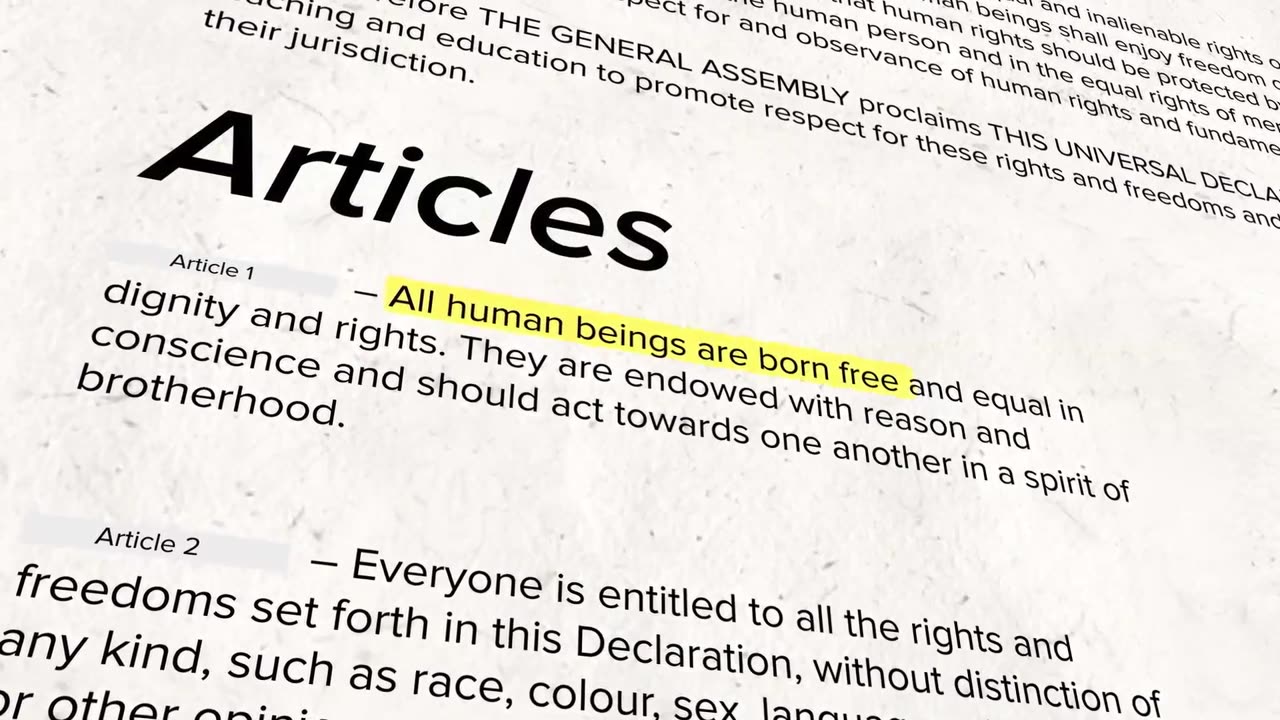Premium Only Content

The Universal Declaration of Human Rights (UDHR)
The Universal Declaration of Human Rights (UDHR) is a foundational document in the history of human rights, consisting of a preamble and 30 articles that outline the rights and freedoms to which all individuals are entitled. Here's a detailed overview of its contents:
Preamble
The preamble sets the stage for the declaration, emphasizing the importance of human rights for the foundation of freedom, justice, and peace in the world. It acknowledges the inherent dignity and the equal and inalienable rights of all members of the human family as the foundation of freedom, justice, and peace. It also references the disregard and contempt for human rights that resulted in barbarous acts which have outraged the conscience of mankind, and it states the advent of a world in which human beings shall enjoy freedom of speech and belief, and freedom from fear and want as the highest aspiration of the common people.
Articles Summary
-Article 1 states that all human beings are born free and equal in dignity and rights, endowed with reason and conscience, and should act towards one another in a spirit of brotherhood.
-Article 2 outlines the entitlement of all rights and freedoms set forth in the Declaration, without distinction of any kind, such as race, color, sex, language, religion, political or other opinions, national or social origin, property, birth, or other status.
-Article 3 asserts that everyone has the right to life, liberty, and security of person.
-Article 4 prohibits slavery and the slave trade in all their forms.
-Article 5 states that no one shall be subjected to torture or to cruel, inhuman, or degrading treatment or punishment.
-Article 6 affirms that everyone has the right to recognition everywhere as a person before the law.
-Articles 7 to 11 establish the principles of equality before the law, the right to a fair and public hearing by an independent and impartial tribunal, and the presumption of innocence until proven guilty.
-Articles 12 to 17 cover the protection of privacy, family, home, correspondence, freedom of movement, the right to seek asylum from persecution, the right to a nationality, and the protection of property.
-Articles 18 to 21 emphasize the freedoms of thought, conscience, religion, opinion and expression, peaceful assembly and association, and the right to take part in government directly or through freely chosen representatives.
-Articles 22 to 27 detail economic, social, and cultural rights, including the right to social security, work, rest and leisure, a standard of living adequate for health and well-being, education, and participation in cultural life.
-Articles 28 to 30 conclude with the right to a social and international order in which these rights can be fully realized, the duties to the community essential for free and full development of personality, and the prohibition of any state, group, or person to engage in any activity aimed at the destruction of the rights and freedoms set forth in the Declaration.
The UDHR is not a legally binding treaty but serves as a powerful symbol of international consensus on human rights. It has inspired the creation of legally binding treaties on human rights and is considered the foundation of international human rights law.
Read it for yourself here: https://ia802501.us.archive.org/26/items/universaldeclara00unse/universaldeclara00unse.pdf
-
 56:24
56:24
Russell Brand
23 hours agoEddie Gallagher: War, Betrayal & Fighting the System
67.2K8 -
 11:21
11:21
TimcastIRL
3 hours agoGOP Rep Says TWO SHOOTERS In JFK Assassination As FBI Uncovers TROVE Of Secret Documents
24.1K42 -
 1:04:55
1:04:55
Bare Knuckle Fighting Championship
3 days agoBKFC ITALY PRESS CONFERENCE | LIVE!
1.82K -
 10:04
10:04
Space Ice
1 hour agoThe Movie Silent Hill Is Like Resident Evil Without The Good Parts - Worst Movie Ever
652 -
 5:49
5:49
Hannah Barron
22 hours agoRedneck Euro Mount
4.28K17 -
 32:34
32:34
hickok45
6 hours agoSunday Shoot-a-Round # 268
1.15K6 -
 27:33
27:33
The Finance Hub
16 hours ago $0.20 earnedBREAKING: ALINA HABBA JUST DROPPED A MASSIVE BOMBSHELL!!!
2528 -
 40:23
40:23
PMG
20 hours ago $0.06 earnedHannah Faulkner and Dr. Michael Schwartz | EXPOSING BIG PHARMA
836 -
 18:55
18:55
GBGunsRumble
18 hours agoGBGuns Range Report & Channel Update 15FEB25
155 -
 13:31:32
13:31:32
iViperKing
19 hours agoGood Times + Good Energy Ft. Whez.. #VKGFAM #RRR
82.3K15